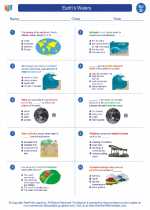Archaea
Archaea are a group of single-celled microorganisms that are similar to bacteria but are genetically and metabolically different. They are considered one of the three domains of life, alongside bacteria and eukaryotes.
Characteristics of Archaea
- Cell Structure: Archaea have a simple cell structure without a nucleus or other membrane-bound organelles.
- Cell Wall: Some archaea have cell walls, but these are chemically different from bacterial cell walls.
- Metabolism: Archaea are known for their ability to thrive in extreme environments, such as high temperatures, high salinity, and acidic conditions. They can be found in environments like hot springs, deep-sea hydrothermal vents, and salt flats.
- Genetics: Archaea have unique genetic sequences and share some genetic characteristics with both bacteria and eukaryotes.
Importance of Archaea
Archaea play a crucial role in various ecosystems, including their involvement in nutrient cycling and their ability to adapt to extreme conditions. They also have potential applications in biotechnology and industrial processes.
Study Tips
When studying archaea, it's important to focus on their unique characteristics, their role in different environments, and their significance in the context of evolutionary biology and ecology. Make sure to review the differences between archaea, bacteria, and eukaryotes, as well as their genetic and metabolic differences.
Quiz Questions
- What are the main characteristics of archaea?
- Where can archaea be found?
- What is the significance of archaea in ecosystems?
◂Science Worksheets and Study Guides Fourth Grade. Earth's Waters

 Worksheet/Answer key
Worksheet/Answer key
 Worksheet/Answer key
Worksheet/Answer key
 Worksheet/Answer key
Worksheet/Answer key
 Vocabulary/Answer key
Vocabulary/Answer key
 Vocabulary/Answer key
Vocabulary/Answer key
